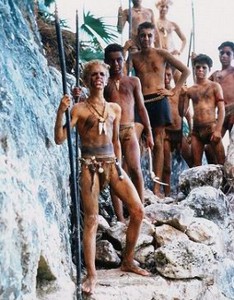Lord Of The Flies Themes: Human Nature, Society, Fear
Introduction To Lord Of The Flies Themes
Although published in 1954, Lord of the Flies by William Golding is still one of the most widely read and frequently challenged books today. The novel examines controversial aspects of human nature and the implications for society.Comparison Of The Themes In Lord Of The Flies And The Coral Island
Lord of the Flies was written as a response to the novel The Coral Island and is in many ways the anti-thesis of that book. In The Coral Island, a group of boys become stranded on an island in the Coral Sea and learn to happily live in peace and harmony with each other and their environment. Thus The Coral Island attempts to demonstrate that humans are born good at heart and that evil is an external force present in the world which tempts once innocent people. Once free of the temptations created by adults and society the boys are able to live happily ever after in a peaceful utopia.Lord of the Flies takes the opposite view: that evil comes from within. Golding's message is that human nature has a wicked side and that without punishments to keep it in check society would degenerate into a barbaric anarchy. Lord of the Flies illustrates this theme through the story of a group of boys stranded on an island who must overcome not only the natural difficulties presented by the island but also the difficulties presented by their own inherent human nature. Throughout the novel we witness the gradual decline of the morals of the individual boys and therefore the eventual decline of their constructed society as a whole.
The Theme Of Human Nature In Lord Of The Flies

Jack and the Hunters in the 1990
film adaptation of Lord Of The Flies
As the boys begin to fear a superstition they create called "the beast" it is Simon who realises that what they should really fear is the beast within themselves. "Fancy thinking the Beast was something you could hunt and kill! You knew, didn't you? I'm part of you? Close, close, close!" (The Pig's Head talking to Simon). The culmination of the boys' fall from grace comes when Piggy is murdered by Roger deliberately and in cold blood. As Piggy is killed, the conch - a symbol of authority and order - is also destroyed symbolising the complete rejection of the moral code.
The Theme Of Society In Lord Of The Flies
From this view of human nature Golding draws deep implications for society. He believes that because of the fundamental potential in every person to commit evil acts there will always be criminals and wrong doers in society no matter how well intentioned a society's ideologies. Therefore a society without laws and law enforcement will inevitably fail.Roger's behaviour is a good illustration of this point. Early on in the story he throws rocks at the littleuns. As he is still used to the rules and punishments of his previous society he is careful not to hit them though. By the end of the book Roger has realised that in their new society there are no consequences for misdeeds and so he is free to drop a huge rock onto Piggy.
William Golding: "the theme (of the book) is an attempt to trace back the defects of society to the defects of human nature...The moral is that the shape of society must depend on the ethical nature of the individual and not on any political system."
Conclusion To Lord Of The Flies Themes
In Lord of the Flies William Golding conducts a sociological thought experiment. He takes a group of young boys and places them on a deserted island and asks what will the result be, a utopia or a distopia? His answer is the latter. His reason is man himself."Ralph wept for the end of innocence, the darkness of man's heart, and the fall through the air of the true, wise friend called Piggy"
